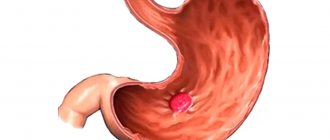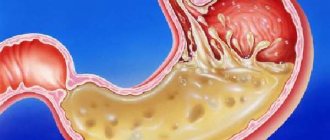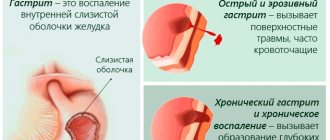What can cause gastritis?
At first glance, it may seem that a stomach ulcer or gastritis can only be caused by external factors. Poor nutrition, bad habits, poor quality products. Undoubtedly, all this has an effect on the functioning of the gastrointestinal tract. However, experts say that more and more often the causes of stomach diseases are so-called internal factors, or psychosomatics.
Life at a frantic pace, constant stress, tension - these are the true causes of nervous gastritis
Life at a frantic pace, constant stress, tension - these are the true causes of nervous gastritis. A person may not feel the harmful influence of modernity on his life. We are bombarded with tons of information every day, sometimes not the most pleasant.
A quarrel with a work colleague or boss, constant traffic jams and, as a result, the inability to fully rest and recuperate. You may not see life that way, but that's how your stomach perceives it.
Think about it, all organs receive signals from the brain. And the brain works without stopping for a second. It constantly reads and remembers the surrounding environment, records the mood and reaction to a particular stimulus - and distributes all this throughout the body:
- the area of the mouth and throat receives information about what you wanted to say, but never said;
- the reproductive system receives information about whether you like yourself today (and always) or not;
- and in the stomach area information comes mainly about emotions, whether you were able to cope with them, “digest” them or not.
What is nervous gastritis?
Any stressful condition leaves its mark on a person’s health, so it is not surprising that after a while gastritis appears due to nervousness. Naturally, it is impossible to immediately notice the negative effects of stress, but in the end they become the cause of various diseases, among which gastritis, which occurs against the background of stress, occupies the first ranks.
Any stressful situation leads to overstrain, and at this moment the nervous system is most vulnerable, since the worsened condition is reflected in the form of spasms of blood vessels, which, in turn, interferes with blood supply to the mucous membrane. Insufficient supply of oxygen and nutrients leads to the fact that the mucous membranes of the entire body are affected, and after some time their functions noticeably deteriorate. Due to nerves and frequent breakdowns in the stomach, the integrity of the mucous membrane is disrupted, and this is the first sign of gastritis.
Emotional overstrain with repeated repetitions aggravates an already difficult situation, leading to the destruction of the integrity of the protective layer in the stomach even more. Gastric juice located in the cavity of the organ corrodes its delicate tissue, leading to digestive problems and disturbances in the gastrointestinal tract.
Every stress affects the body, thereby bringing the onset of a serious disease closer.
A person who has been in a stressful state for a long time and does not find the ability to overcome a negative situation becomes a hostage to depression, i.e., he unconsciously creates favorable conditions for imbalance in the body, which leads to the development of pathology. The appearance of nervous gastritis is absolutely no different from other forms of the disease, except for the reasons why it occurs.
Factors in the development of stress gastritis
The causes of nervous gastritis are associated with the following phenomena:
- recurrent depressive states;
- increased irritability due to lack of sleep;
- chronic fatigue;
- regularly being in stressful situations.
During stress, disruption of the normal functioning of nerves leads to spasm of blood vessels, and blood flow in the organ is disrupted. Uneven distribution of oxygen and nutrients affects the organ's ability to perform its function. From nerves, that is, repeated stress, the integrity of the gastric mucosa is disrupted, and pathology can arise.
It is not easy to treat nervous gastritis, because before starting therapy it is important to exclude all existing factors influencing the function of the digestive organs. Each patient will have a common set of symptoms, but the reasons are different, except that the nervous system suffers, therefore the condition for successful therapy will be an accurate understanding of the etiology of the disease.
The condition can also be aggravated by:
- long-term use of medications;
- the presence of other gastrointestinal diseases;
- bacteria helicobacter pylori;
- pathologies associated with increased stomach acidity;
- lack of diet and nutrition (rarely eating large portions);
- smoking, drinking alcohol and drugs.
Could this be gastritis?
This pathology of the stomach is diagnosed in more than 50% of the population, the cause of which is nervous breakdowns, depression, and stress. Such shocks negatively affect the functions of the human autonomic system, which controls the functioning of internal organs and blood vessels.
Part of the autonomic nervous system is the enteric nervous system (ENS), it regulates the smooth muscles of internal organs that have contractile activity and plays an important role in the physical and mental state of a person. The ENS is a bundle of nerve fibers (neurons), they are located in two layers of intestinal tissue, under the influence of stress they become more vulnerable. The enteric nervous system is also located in the walls of the stomach, which is why digestion is disrupted.
When a person experiences stress, circulatory disturbances occur in the gastric mucosa and salivation changes. Failures in the functionality of the gastrointestinal tract are explained by pathologies in the secretion of digestive juice and impaired contraction of the intestinal walls.
Myth 5. Chronic gastritis is just an infection; antibiotics are enough to treat it
This statement can conditionally be called an “enlightened” myth, since it is based on one of the most modern theories of the development of the disease. Indeed, the treatment of chronic gastritis in most cases requires antibacterial drugs. But even anti-Helicobacter therapy regimens require drugs from other groups (drugs to reduce acidity and restore the mucous membrane).
There are types of gastritis in the development of which bacteria do not play a role (autoimmune, “chemical”), their treatment requires a different approach.
Causes of nervous gastritis
Under stress, the nerves are overstrained and vulnerable, the deterioration of their condition has a spasmodic effect on the blood vessels, and, consequently, disrupts the blood supply to the mucous membranes. With an uneven supply of nutrients and oxygen, the mucous membranes of the entire body suffer and their function deteriorates. Due to nervous conditions in the stomach, the integrity of the mucous membrane is disrupted. These are harbingers of incipient gastritis. Frequently repeated nervous strains aggravate the situation and destroy the integrity of the layer even more.
When food juice enters the stomach cavity, hydrochloric acid irritates and destroys the tissue of the organ. Motor functions weaken, which contributes to the appearance of the first problems with digestion of food and problems in the gastrointestinal tract. Each subsequent nervous breakdown brings the development of gastritis closer. If a person is constantly depressed and does not find the strength to overcome the situation, depression “rolls over” him - the balance in the body is upset and this serves as fertile ground for the development of gastritis due to nervousness.
The course of “nervous” gastritis is no different from other forms of gastritis, the only difference is in the reasons that contribute to its appearance and development.
How it manifests itself
Frequent manifestations of nervous gastritis are:
- dyspepsia (heartburn, hiccups, belching of sour contents);
- soreness in the stomach;
- nausea without vomiting;
- decreased appetite.
With an exacerbation of the disease, the clinic is supplemented by such symptoms as constant discomfort in the epigastric region, increased abdominal pain after eating spicy, fried foods, the sudden appearance of acute pain, to the point that the patient loses consciousness.
Diagnosis of gastritis includes tests for the determination of the helicobacter bacterium, a general blood test, ultrasound examination of the stomach, and additionally, fibrogastroduodenoscopy.
How does a nervous disorder affect the stomach?
When you have a nervous disorder, blood circulation to the mucous membranes deteriorates throughout the body.
When you have a nervous disorder, blood circulation to the mucous membranes deteriorates throughout the body. We all know well from anatomy lessons that the human digestive organs have a mucous membrane. And at that moment when its integrity is violated, the initial signs of gastritis appear.
To put it in other non-medical words, no matter how you maintain a healthy lifestyle and eat healthy food, it is impossible to avoid damage to the nervous system under stress, which means that gastritis is guaranteed. In general, occurring disturbances in the condition of the gastric mucosa will lead to its abnormal functioning.
And from this moment this type of disease begins to start, and over the years it accumulates and accumulates. And if you continue to have nervous breakdowns for a long time, then you are getting closer and closer to stomach disease.
If a person is constantly in a depressed state, or even worse, on the verge of a breakdown, then a direct process of disruption of the protective function of the stomach occurs. And this condition is the most favorable condition for the development of gastritis due to nervousness.
Let's look at what nervous gastritis is and how it differs from regular gastritis. So, nervous gastritis is called ordinary gastritis, which was caused as a result of a nervous breakdown. These two types of gastritis have a number of differences. In medical practice, there are different types and different causes for the development of this disease. One of these types is nervous gastritis, which appears due to the patient’s nervous system. If you look at the statistics of the disease, you can see that this type of disease affects 80% of people all over the planet.
Data was provided by the World Health Organization. Nervous gastritis can cause dangerous and serious diseases such as stomach ulcers and oncology. But this disease can develop not only due to nervousness, but also due to an unbalanced diet, smoking, alcohol, frequent use of medications, predisposition and the well-known bacterium Helicobacter.
If you do not have any of the above reasons and doctors still diagnose gastritis, then you need to think about the proper functioning of the nervous system. Due to constant stress, a busy work schedule, chronic fatigue and a negative emotional state of mind, gastritis begins to develop in the human body at a rapid pace. This trend is mainly observed among residents of the metropolis, and scientists claim that urban residents are more susceptible to this disease.
Stress is the cause of gastritis
Why are symptoms of gastritis due to nervousness also accompanying psychological stress? The fact is that during stress, blood vessels contract, which causes a disruption in the blood supply to the mucous membranes. Their functionality and integrity are compromised. Nervous gastritis is called gastritis, which develops due to constant stress. According to unofficial statistics, about 80% of the total population of the planet suffers from this disorder. Gastritis, which is acquired by overexertion and stress, can develop into stomach ulcers and even cancer. That is why its first symptoms should never be ignored.
Can a person have a stomach ache due to nervousness?
Can stomach pain be caused by nervousness? We know very well that many diseases arise from disorders of the nervous system, and this is not an unfounded fact. It has long been proven by medical specialists that the physical state of the body depends on the emotional state of a person. Constant nervous stress affects the entire body, but very often it starts from the heart and ends with the gastrointestinal tract. But the most interesting thing is that the digestive system ranks first in the ranking of those organs that suffer primarily from nerves.
Signs of gastritis of the human stomach
There are individual symptoms of nervous gastritis in the body:
- Increased stomach acid: belching with stomach acid, pain on an empty stomach or immediately after eating.
- Decreased stomach acid: belching, bloating, nausea, loss of appetite, diarrhea, hardening of the abdomen, pain under the shoulder blade.
Often the symptoms are not clearly expressed, the patient does not notice them for a long time. With such a disease, delay in seeing a doctor is fraught with serious consequences. The disease does not go away on its own, developing into a serious stage - chronic. Inflammation of the mucous membrane spreads deeper and deeper.
It is worth paying attention to associated symptoms that hint at the disease: drowsiness, heart pain, arrhythmia, hypotension. Early diagnosis is the key to successful treatment.
Symptoms of gastritis due to nervousness
Not only stressful situations cause gastritis. Poor nutrition, smoking, certain medications, genetic predisposition, etc. contribute to the progression of the disease and lead to the appearance of nervous gastritis, the symptoms of which are as follows:
- Pain. If treatment is not started in a timely manner, gastritis manifests itself not only in pain. Added to this are frequent fainting, vomiting, reflex spasm, and duodenal ulcer. Therefore, if you feel pain after a nervous shock, you should seek advice from a doctor, since ignoring such symptoms can lead to the appearance of associated disorders:
- Belching, accompanied by a putrid odor.
- Heartburn, nausea and burning sensation in the esophagus, which subsides after taking it.
- Frequent bloating, colic.
- Heaviness in the stomach after eating.
- Diarrhea.
In addition to these manifestations, nervous gastritis is accompanied by drowsiness, constant fatigue, pain in the heart, arrhythmia and low blood pressure. It is not recommended to independently establish a diagnosis and choose a treatment method, since such actions can cause the development of irreversible processes.
Therefore, having discovered one of the symptoms of the disease, a person should, if possible, visit a doctor and get recommendations.
Clinical picture
Gastritis from nerves may not manifest itself in any way at an early stage. Therefore, in order to start treatment in a timely manner and prevent complications at the first symptoms of the disease, it is recommended to consult a specialist. So, the clinical picture of the pathology has both general and stress-specific signs.
The general symptoms of the stressful type of disease are practically no different from the typical form of gastritis. It includes the following features:
- pain or discomfort in the upper abdomen (epigastric region);
- dyspeptic syndrome: nausea, vomiting, sour belching, heartburn;
- intoxication syndrome – weakness, fatigue, decreased performance;
- feeling of a lump in the throat;
- flatulence;
- coated tongue;
- sometimes - diarrhea or constipation;
- decreased or lack of appetite.
In the chronic form of the pathology, during the period of exacerbation, an increase in the above symptoms is observed.
Since the main cause of this type of gastritis is a stress factor, the characteristic clinical picture of the disease is associated with disruption of the human nervous system. It includes the following features:
- drowsiness or vice versa – lack of sleep;
- increased irritability;
- constant feeling of nervous tension;
- apathy;
- pain and discomfort in the heart area;
- hypotension;
- rhythm disturbances;
- tachycardia;
- headache.
Depending on the course of the disease, these symptoms may have varying intensity.
How to treat gastritis due to nervousness
In addition to a visit to a gastroenterologist, a consultation with a psychotherapist is necessary.
It will help the patient understand the reasons for the development of pathology and restore emotional stability. Gastritis is more common among residents of megacities. If you have a busy work schedule combined with a sedentary lifestyle, then most likely there are signs of the disease. It is worth paying attention to irritating factors and thinking about your health. The very reason for its appearance suggests ways to eliminate the disease.
But, in addition to a visit to a gastroenterologist, a consultation with a psychotherapist is necessary. It will help the patient understand the reasons for the development of pathology and restore emotional stability. Frequent stress and gastritis are interconnected, so it is necessary to make every effort and learn to ignore or avoid all sorts of conflict situations, which can subsequently affect your health. The specialist will give the necessary recommendations to help you distance yourself from the influence of negative factors that accompany everyone’s life.
Therapy for gastritis begins with examination and diagnosis, after which the attending physician prescribes medications that can restore the functions of the diseased stomach. The help of a psychotherapist has a positive effect on the patient’s general health, which is important in the treatment of diseases. In addition to drug therapy, dietary nutrition and emotional rest are prescribed.
It will be possible to cure the disease only with the understanding that emotional stability and avoidance of stressful situations have a destructive effect on the body of every person. The ability to isolate yourself from negative factors is of great importance in the treatment of nervous gastritis and strengthening the nervous system.
How does the disease occur?
Most often, the psychological prerequisites for the occurrence of gastritis or even peptic ulcers are prolonged overexertion and anxiety. These could be difficulties at work, family quarrels. It is not the situations themselves that affect the body, but the negative emotions that a person experiences. Many studies have been conducted that have proven that gastritis most often develops in people who have certain psychological characteristics. Scientists have also discovered the opposite. When working through the consequences of stress, significant improvements occur in the patient’s condition.
Methods for treating nervous gastritis
The method of treating this type of gastrointestinal disease depends on the cause of the disease. Therefore, in addition to the help of gastroenterology, a consultation with a psychotherapist is necessary. The psychotherapist will help the patient overcome anxiety and depression, teach him to relax at the right time. The decisive factor in the treatment of a disease that corresponds to the symptoms of this type of gastritis is the prescription of diet and emotional rest, with the exception of provoking factors.
Before starting a treatment course, it is recommended to conduct an accurate diagnosis. The main method in this case is gastroscopy, which is now, thanks to the developments of Japanese scientists, carried out completely painlessly. Among the types of nervous-based gastritis of a chronic form associated with disturbances in gastric motility, one can distinguish reflex gastritis, which develops against the background of diseases of other organs and is caused by disturbances in the neuro-reflex regulation of the stomach.
Such gastritis can be called secondary. Inflammation of other organs contributes to a deterioration in the blood supply to cells, which, together with nervous disorders, provokes the development of ulcerative lesions of the gastric mucosa. After eliminating the destabilizing factors affecting mental health, treatment is prescribed based on the test results. In most cases, the cause of nervous gastritis is the bacteria Helicobacter pylori and treatment is based on the use of antibiotics in combination with drugs that relieve unpleasant symptoms.
Antacids are used to quickly eliminate symptoms such as belching, heartburn, and pain.
Antibiotics are taken for about two weeks. Antacids are used to quickly eliminate symptoms such as belching, heartburn, and pain. Antisecretory drugs are used in cases of increased acidity, and prokinetics are necessary to normalize tone. Drug treatment is combined with diet therapy. When the disease becomes more acute, special The diet should be strict, eliminating food intake completely for at least one day.
The transition to the chronic stage of nervous gastritis allows you to switch to a specialized menu, adjusted depending on the person’s condition. In any case, it is necessary to exclude strong meat broths, fatty, spicy, salty and spicy foods from the diet. Consume lean meats, poultry, fish, vegetables, steamed or boiled.
In addition to the diet, you should adhere to certain rules for regularly eating in small portions, spending more time in the fresh air, and avoiding physical activity such as lifting weights. And most importantly, learn to control your emotions, understanding that the painful perception of unpleasant situations primarily affects the state of the stomach.
Prevention: how to avoid disease
When it comes to illness, it is important to remember that it is easier to prevent a disease than to cure it. Gastritis is caused by nerves, so it’s worth thinking about your own attitude to work. Most stressful situations occur directly at work. The employee takes a variety of work situations too seriously, but being too obsessed is not helpful.
An important component of prevention is proper nutrition. It is not recommended to use seasonings that irritate the gastrointestinal mucosa while eating. Try not to eat too hot food, cool it to the optimal temperature. Spicy or hot food entering the mouth is perceived only by the tongue and palate. The stomach reports discomfort much later, having no nerve endings.
Take high-quality food, monitor expiration dates, and re-read the ingredients of purchased products. It is advisable to completely exclude products with industrial additives from the diet. Food poisoning has a detrimental effect on health, not always immediately. If the work involves heavy production, it is imperative to follow the safety instructions.
Abuse of tobacco products, alcohol and poor lifestyle have a destructive effect on the stomach. The mucous membrane loses its efficiency and gradually atrophies.
It is important to follow a diet. Food intake must occur within the recommended time frame; gastric juice is produced within a certain period. It is important that there is food in the stomach during this period. Otherwise, gastric juice will simply begin to process the walls.
With gastritis due to nervousness, the functions of the stomach are disrupted. To avoid this, it is recommended to chew the food you eat thoroughly. Try to contact your dentist on time. Or see a dental prosthetics specialist. A healthy person is required to visit a doctor at least once a year.
You can’t leave resolving difficulties overnight; try to postpone difficult conversations until the next day. At night, the body must rest fully; even the process of digesting food is suspended at night. It is not recommended to eat before bed. You should fall asleep with satisfaction and peace of mind. Love and appreciate yourself, and you will be healthy!
Doctors have long known that regulating the activity of the nervous system is part of the treatment of gastritis. The influence of stress and psychological factors on the state of the stomach was not denied even in the Soviet era. Gastritis caused by adverse effects on the psyche requires a special approach. You cannot do this without the help of a gastroenterologist or psychotherapy.
Remedies for the treatment of gastritis due to nervous conditions
Antibacterial agents are prescribed if gastritis was already present in the patient’s stomach, was caused by bacteria and was complicated by nervous disorders. You can take medications only in certain cases. Antibiotics are prescribed to patients with gastritis in the stomach on the nerve kidney, in whom the bacterium Helicobacter pylori has been detected.
Prescribed:
- Tetracycline;
- Amoxicillin;
- Clarithromycin.
The duration of therapy for nervous gastritis in the stomach is 2 weeks. For heartburn, belching and abdominal pain, antacid medications are prescribed. Patients with nervous gastritis are prescribed the use of Gevixon, Vikair, Maalox, Rennie. For pain they take antispasmodic and anticholinergic medications:
In addition to medications and soothing herbs, you should follow your diet. Irregular eating leads to the production of gastric juice. If too much of it is secreted, the mucous membrane of the organ is burned, which leads to a worsening of gastritis due to nervous conditions.
In addition to medications and soothing herbs, you should follow your diet. Irregular eating leads to the production of gastric juice
If gastric juice is secreted in small quantities, fermentation processes begin, and food with sharp edges scratches the mucous membrane. Contact with gastric juice on a scratch leads to progression of the disease.
To avoid worsening nervous gastritis of the stomach, avoid consuming:
- citrus fruits;
- tomatoes;
- milk and other dairy products;
- alcohol;
- coffee;
- spicy food;
- refined and processed foods.
For nervous gastritis, you should eat 4-6 times a day in small portions. The menu is selected by a nutritionist or attending physician. Products, the use of which will help overcome gastritis due to nervousness:
- artichoke, leafy greens, asparagus, celery;
- garlic;
- licorice, fennel;
- legumes, nuts (almonds), flaxseed, buckwheat.
Be sure to eat healthy fats and proteins for nervous gastritis; they are found in eggs, fish, and poultry. Fish, such as salmon or sardines, are rich in omega-3 fatty acids and have anti-inflammatory effects.
Nervous gastritis is a dangerous disease that can lead to bleeding and ulcer formation. It is important to eliminate the cause of pain - the current psychological situation.
sources
https://lekardoma.ru /zdorove/gastrit-na-nervnoj-pochve-simptomy-reflektornyj-lechenie
https://sammedic.ru/332616a-gastrit-na-nervnoy-pochve-simptomyi-i-lechenie
Treatment
The first thing prescribed for gastritis is a strict diet. If an exacerbation occurs, it is recommended to abstain from food altogether for the first one or two days, only drink. Against the background of decreased appetite, such a diet is most appropriate. As the condition of the mucous membrane is restored, gentle nutrition is added - fresh, low-fat dishes. Food must be pureed.
The doctor prescribes drugs that coat the walls of the stomach and also reduce acidity. In addition, it is necessary to take antibiotics against the bacterium Helicobacter Pylori. As a rule, therapy is carried out at home and takes 1-2 weeks. Patients should be under the supervision of a physician. In addition, even after recovery, you must visit your doctor twice a year.
Among folk remedies, flax is often used to treat illness. Various tinctures and thick decoctions are prepared from it. They envelop the walls of the stomach and reduce pain. Sea buckthorn oil is also used in folk medicine. It should be taken twice a day, a teaspoon before meals. However, before using any means, you should consult your doctor.










